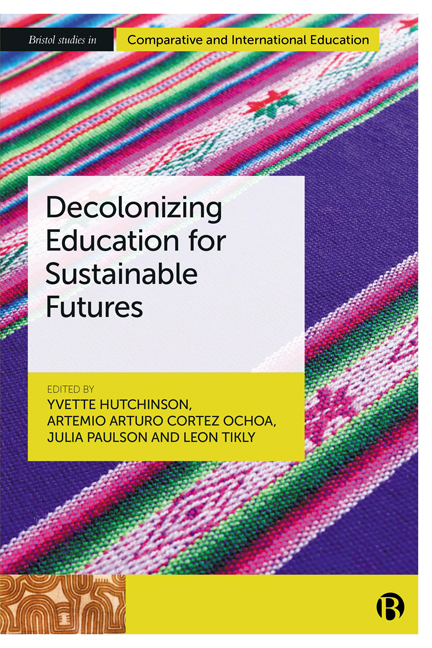Book contents
- Frontmatter
- Contents
- Series Editor Preface
- List of Figures and Table
- List of Abbreviations
- Notes on Contributors
- Acknowledgements
- Introduction
- PART I Connecting Decolonial and Sustainable Futures in Education
- PART II Decolonizing Education for Sustainable Futures: From Theory to Practice
- PART III Education’s Reparative Possibilities: Responsibilities and Reckonings for Sustainable Futures
- Conclusion
- Afterword
- Index
4 - Reimagining Education: Student Movements and the Possibility of a Critical Pedagogy and Feminist Praxis
Published online by Cambridge University Press: 18 January 2024
- Frontmatter
- Contents
- Series Editor Preface
- List of Figures and Table
- List of Abbreviations
- Notes on Contributors
- Acknowledgements
- Introduction
- PART I Connecting Decolonial and Sustainable Futures in Education
- PART II Decolonizing Education for Sustainable Futures: From Theory to Practice
- PART III Education’s Reparative Possibilities: Responsibilities and Reckonings for Sustainable Futures
- Conclusion
- Afterword
- Index
Summary
Introduction
In reimagining the futures of education in a context of growing global and local inequalities, it is crucial to expand the borders of our ‘situated imagination’ defined through the particularities of our experiences and surroundings (Yuval-Davis, 2013). Such expansion requires an uncomfortable confrontation with a troubling past, and a recognition of the changing nature of the human and non-human world and our role in its destruction or (re)construction. This reimagining is crucial at a time when the Anthropocene epoch is marred by the rise of right-wing populism in countries across the global North and South dictated by a market-driven ideology of capitalist expansion at the expense of planetary sustainability. Technological advancement and online connectivity that ought to have created a greater possibility of ‘border crossing’ (Giroux, 2005) have instead resulted in greater surveillance and control, with identities digitized for bureaucratic management in the name of security (Saunders, 2016).
The existence of such insular world views can be found in different parts of the world: in the UK's decision to leave the European Union at a time where greater cooperation and coordination is needed to take on the challenges of an environmental and climate emergency, and a refugee crisis; in the USA's decision to withdraw from the Paris Agreement that brought nations together to ensure a ‘global response’ to the climate emergency (Climate Action Tracker, 2020a); or in the increasing deforestation of the Amazon in Brazil, which increased by more than 80 per cent in 2019, with environmental activists, Indigenous leaders and ‘forest defenders’ being killed by mafias (Human Rights Watch, 2020; Angelo, 2020; Climate Action Tracker, 2020b). These are just a few examples of how the physical and ideological borders of the nation-state are being reinforced to promote selfinterest at the expense of civic, environmental, ecological and human rights.
Simultaneously, in the face of political self-interest that has wreaked human and ecological devastation, a reimagining of the future is already taking place through student-led campaigns and movements, with young people taking charge of their own futures.
- Type
- Chapter
- Information
- Decolonizing Education for Sustainable Futures , pp. 85 - 100Publisher: Bristol University PressPrint publication year: 2023

